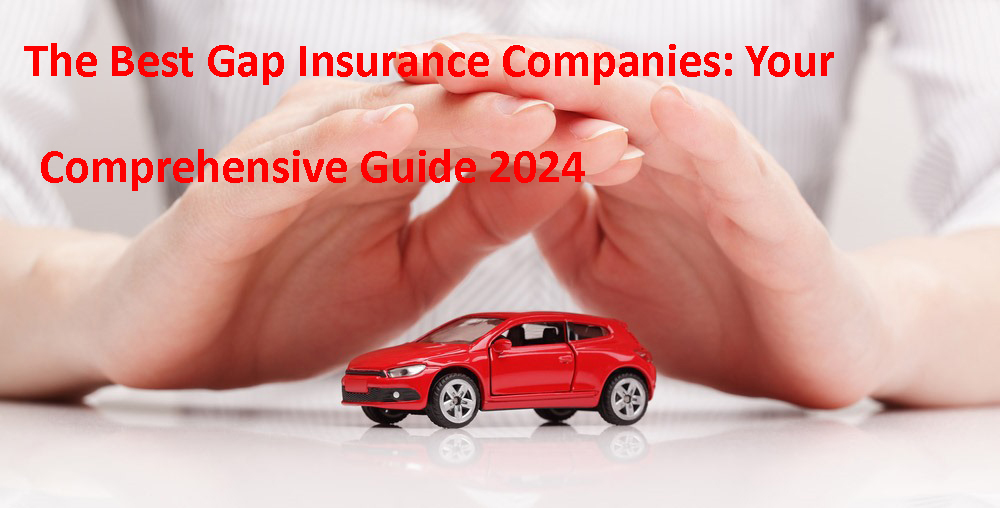Introduction to Gap Insurance
Gap insurance, or Guaranteed Asset Protection insurance, is essential for car owners who finance or lease their vehicles. It covers the difference (or “gap”) between the amount you owe on your vehicle and its actual cash value in the event of a total loss. This coverage is particularly valuable, as most standard auto insurance policies only pay out the vehicle’s market value at the time of the loss. In this article, we’ll explore the best gap insurance companies, their offerings, and what to consider when choosing a policy.

Why You Need Gap Insurance
1. Protection Against Depreciation
New cars depreciate quickly often losing 20% of their value within the first year. If you were to total your car, your standard insurance payout may not cover the remaining balance on your loan or lease. Gap insurance protects you from this financial loss.
2. Peace of Mind
Driving a new or financed vehicle can be stressful, especially if you’re worried about potential losses. Gap insurance provides peace of mind, knowing you won’t face a financial burden if your car is totaled.
3. Lender Requirements
Some lenders require gap insurance as part of the financing agreement. Having this coverage can also make the loan process smoother.
Read Also:The Magic Presented at HP Imagine 2023
Top Gap Insurance Companies

1. Geico
- Overview: Geico is well-known for its competitive rates and excellent customer service.
- Features: Offers flexible coverage options and a user-friendly mobile app for easy policy management.
- Pros: Quick claims process and 24/7 customer support.
2. Progressive
- Overview: Progressive is one of the largest insurance providers in the U.S. and offers comprehensive gap insurance.
- Features: Offers customizable policies to fit individual needs.
- Pros: Extensive online tools for quotes and policy management.
3. Allstate
- Overview: Allstate is a trusted name in insurance, providing gap coverage alongside a range of other auto insurance products.
- Features: Discounts for bundling gap insurance with auto insurance policies.
- Pros: Strong financial stability and reliable customer service.
4. State Farm
- Overview: State Farm offers gap insurance as part of its auto insurance policies.
- Features: Extensive local agent network for personalized service.
- Pros: High customer satisfaction ratings and efficient claims processing.
5. Nationwide
- Overview: Nationwide provides gap insurance with flexible terms and options.
- Features: Offers competitive pricing and discounts for safe driving.
- Pros: Strong financial ratings and comprehensive customer support.
Read Also:When Is An Aussiedoodle Full Grown – Best Guide in 2022
What to Consider When Choosing Gap Insurance

1. Coverage Amount
Make sure to assess how much gap coverage you need. Understand the difference between your vehicle’s current market value and the amount you owe.
2. Policy Terms
Different companies offer varying policy terms. Review these terms carefully to ensure you’re getting the coverage you need.
3. Premium Costs
Compare premium costs among different insurers. Keep in mind that the cheapest option isn’t always the best. Look for a balance of cost and coverage.
4. Claims Process
Research each company’s claims process. A streamlined and efficient claims process can make a significant difference when you need to file a claim.
5. Customer Reviews
Read customer reviews and ratings on independent platforms. This can provide insight into the company’s service quality and claims handling.
Read Also:The Best Basenji Yodels – Best Guide 2022
Conclusion

Choosing the right gap insurance company is crucial for protecting your financial investment in your vehicle. Companies like Geico, Progressive, Allstate, State Farm, and Nationwide offer robust gap insurance options tailored to meet various needs. By considering your specific requirements and comparing offerings, you can ensure you have the right coverage in place.
Read Also:Microsoft Copilot Is Coming: It’s Both Exciting and a Bit Sad